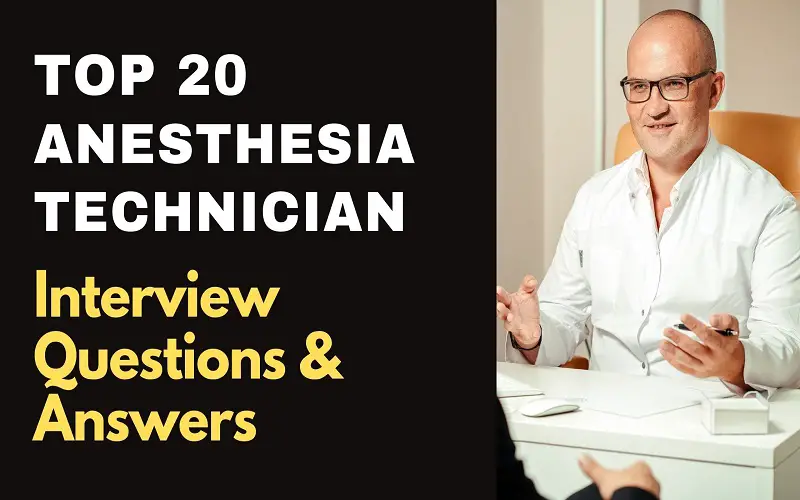Anesthesia technicians are healthcare workers who play patient care roles by mainly administering and monitoring anesthesia effects. These professionals have lots of knowledge on anesthesia techniques, technology, and supplies.
This article will look at several questions that you should expect in an anesthesia technician interview. Most of these will test your experience, skillset, and qualities to determine if, indeed, you will be an excellent addition to the health facility.
We also urge you to work on your presentation and other interview skills as you look at these questions. Remember, getting everything right and not caring about posture and the first impression will likely cost you the job.
Take a look at the following:
1. Why Are You Interested in this Position?
This is a standard opening interview question whose answer should always be at your fingertips. There is a high probability that the interviewer wants to get you talking or is using the question as a foundation for inherent to follow. Make sure that you sell yourself and mention some of the positive contributions you will make to the health center, hospital, or institution.
Sample Answer
I am an experienced anesthesia expert, thanks to my ten years of practice. I have gathered lots of experience and expertise that I believe can be better utilized in your institution. I want to bring a positive difference here as I learn more from your experienced team of doctors.
2. What are the Roles of an Anesthesia Technician?
This is yet another opening question that you should expect in such an interview. Do you understand what an anesthesia technician does? Do you know your mandates? Make sure that you only mention job-specific roles.
Sample Answer
An aesthesia technician checks and sets up the anesthetic machine, organizes and prepares intravenous drugs, ensures that the intravenous administration equipment is in good shape, and prepares all the necessary equipment to maintain a patient’s airway. These can be the endotracheal tube or laryngeal mask.
3. What are some of the Qualities that Make an Anesthesia Technician Effective?
Do you know what it takes to be good at this job? Every job comes with the requisite qualities that you need to be exceptional. The best approach to this question is to mention a few skills and attributes that have brought you this far in your career.
Sample Answer
An anesthesia technician should be good at verbal and written communication; have excellent problem-solving skills; be comfortable with technology and mechanics; have an extensive background in pharmacology, math, and science, and possess incredible computer skills.
4. Mention a Challenge that you faced in your Former Role and How You Managed It
We all want to be around people who can solve problems without spending an eternity complaining about them. The interviewer is testing your problem-solving skills. We advise you not to mention a challenge that was your fault. Think through the experience before telling it to the interviewer.
Sample Answer
I had an unsupportive supervisor who never believed in me and would shout and throw tantrums at the slightest chance. I tried to talk to him and even sought help from the other supervisors but to no avail. When his theatrics were threatening my mental health and productivity, I requested to be transferred to another unit within the hospital, which solved all my problems. However, I was keen not to badmouth him when outlining the reasons for my request.
5. Describe Your Daily Routine
This is a common question that you should always be prepared for when stepping into an interview room. Do you know what you will be doing daily? The surest way of correctly answering this question is by drawing from your experience or the job description. All in all, make sure that all the activities relate to the job.
Sample Answer
My day can either start early or late, depending on the scheduled surgeries. I meet with other anesthesia teams to prepare for the surgeries and go through whatever we need to know and take care of. We prepare the anesthesia equipment to be used and also prep the patients before administering anesthesia. I then record the type and amount of anesthesia and the condition of the patient throughout the surgery. Once the patient has recovered, I ensure that they are taken to another room or ward.
6. Briefly Describe Your Experience
This is a chance to talk about your career, some of the things you have achieved; places you have worked and notable roles you have occupied. However, keep it short, just like the question suggests. Remember, most things you would like to say are captured in the resume and curriculum vitae.
Sample Answer
This is my fifteenth year as an anesthesia technician. I have spent most of my career working in hospital operating rooms and under different anesthesiologists… ( You should then offer as much information as you can about your experience. Remember to mention any particular thing that the interviewer should know regarding your career. This is a chance to sell yourself)
7. Mention a Strategy and Mindset Required For This Role
You definitely know some of the strategies that have made you an excellent anesthesia technician. A strategy refers to a successful means of operation or way of doing things. The mindset is the perspective that guides you as you go about your roles.
Sample Answer
The best strategy for any anesthesia technician is to shift all their focus to the patient. Surgeries can be scary, and therefore, the technician’s role should not stop at prepping the right equipment and administration but also extend to ensuring that the patient is okay throughout the procedure. As for the right mindset, one needs to be positive to inspire hope and reduce the tension experienced before surgery.
8. Mention a Challenge that You Foresee in This Role
Have you gone through the job description, modes of operation, workplace composition, or anything that may reveal a challenge worth mentioning? Mention it but ensure that you do not look incompetent.
Sample Answer
Having been in this field for quite some time, I have experienced almost all the anesthesia technician’s challenges. However, I have managed to overcome them with the help of my team members and the administration. I, therefore, believe that I will also overcome any challenge that comes my way in this job.
9. How Do You Stay Motivated In this Job?
What keeps you going despite all the problems that anesthetic technicians face? This is a common question in interviews that seeks to reveal your source of inspiration. Make sure that you do not mention any monetary or material benefits.
Sample Answer
Seeing people pull through surgeries is highly fulfilling. Knowing that I play an essential role in the success of their operation and recovery gives me the needed push to wade through any challenge that I face. I also look at some of the best moments and obstacles I have conquered in this career whenever I feel demotivated.
10. Mention a Time that You Failed in This Role and the Lesson You Learnt
The interviewer is giving you a chance to prove that you are accountable and able to learn from your mistakes. However, make sure that the experience you provide does not paint you as incompetent.
Sample Answer
My job does not give me room to fail, given how important it is. Therefore, I do everything possible to avoid such instances. However, in my final year of learning, I failed in a unit that I considered easy. I had to do a resit which took a significant toll on me. This experience taught me not to overlook anything, however easy it seems.
[VIDEO] Top 20 Anesthesia Technician Interview Questions with Sample Answers: ► Subscribe for more useful videos
11. In Your Experience, What are the Chances of a Person Dying from General Anesthesia?
The interviewer wants to know how well you understand anesthesia. You don’t have to necessarily draw from your experience. Use your experience in administering anesthesia to come up with the correct answer. Mention some of the instances that can lead to whatever the interview is asking about.
Sample Answer
It is pretty uncommon for a patient to die on the operation table from general anesthesia. However, those with serious problems, complicated medical histories, and post-traumatic stress occasioned by long operations may lose their lives. It is also worth mentioning how rare a person can suffer any anesthesia-related complications since a professional can rectify them quickly.
12. Mention the Types of Anesthesia Used During Surgery
Like the previous one, this is a technical question that seeks to determine just how much you know about your role. What are some of the types of anesthesia you have administered in your work as an anesthesia technician? The best way to answer technical questions is to be as concise and straight to the point as possible.
Sample Answer
We use general anesthesia for surgery. It is usually introduced to make the patient unconscious during a surgical operation. The anesthetic agent can either be inhaled through a mask or induced via an intravenous line. The patient must also maintain proper breathing during surgery through the use of a breathing tube which is usually inserted in the windpipe.
13. Now that You Have Mentioned General Anesthesia Could You Please Mention Some of its Long Term Side Effects?
This is a follow-up question that seeks to reveal just how much you know about general anesthesia. Make sure that you mention all the side effects of general anesthesia to convince the interviewer that you are terrific at your job.
Sample Answer
General anesthesia has several side effects that everyone should know. The most common are temporary confusion and memory loss prevalent in the older generation, dizziness, vomiting, nausea, difficulty in passing urine, shivering, coldness, sore throat, bruising, and soreness. (These are some of the commonest and universally approved side effects. You can mention any other that you have encountered in your time as an anesthesia technician)
14. You Definitely Understand Endoscopy and how it Works. In Your Opinion, is Anesthesia Used for Endoscopy?
This is yet another technical question that seeks to reveal just how much you know about this field. Like most of the technical questions we have looked at, you need to convince the interviewer that you understand the relationship between anesthesia and endoscopy.
Sample Answer
Yes. However, some patients do not need sedation for the successful execution of endoscopic procedures. For those who do, propofol is used and is mainly administered through a vein. It requires a specialized type of monitoring and may call for an anesthesia technician, and the patient may incur additional costs. (This is just an overview. Try to be as specific and detailed as possible. Just make sure that you capture the correct information)
15. Can You Explain to Us About Anesthesia Awareness?
You must have realized that most of these questions are technical. The interviewer is testing specific aspects of anesthesia which will tell if you are good at this job. By now, you know how to deal with such questions.
Sample Answer
Anesthesia awareness is a situation where a patient wakes up during surgery. Most patients end up freaked out since they can remember the surroundings or a particular event regarding the surgical operation while still under genesis anesthesia. However, patients do not feel the operation pain which makes it a pretty harmless occurrence.
16. How rare is this Anesthesia Awareness?
This is a follow-up question. Such questions are asked to clarify previous questions or assessed areas. They, therefore, build up from what the interviewer asked or evaluated before. You can choose to connect this question to the previous one or answer it directly. Make sure that you support your answer using facts or approved studies. Do not rely on random blogs.
Sample Answer
Anesthesia awareness is pretty rare, with several studies estimating it at 1% of all the anesthetic patients. Therefore, in every 21 million patients in the United States, only 21000 wake up during their surgeries yearly and perceive whatever is happening around them. (You can provide links to these studies)
17. What Hours Can You Work?
The interviewer wants to know the hours that you are available for work. This is a test to show how flexible you are. Inform the interviewer that you will be available to work extra hours or show up when asked to. However, make sure that you are honest. If you cannot make it, inform the interviewer if you are not available during such hours.
Sample Answer
I am pretty flexible, even though I cannot work evenings or weekends due to family obligations. I am okay with day shifts and will arrive on time and attend to my roles. I can also show up during emergencies. If you need my services at any of the times I have mentioned above, I ask you to give me ample notice to set my issues in order.
18. Why Do You Believe You Are The Best Option for Us?
How do you feel about your qualifications? Do you think you will fit into the organization? Tell the interviewer why they should hire you and some of the things you will bring to the table that others won’t. Focus on your unique skills and any inherent professional accolade without comparing yourself to anyone.
Sample Answer
I am a well-rounded anesthesia technician who can create a substantial positive difference in this organization. I love what I do and treat my patients as my first priority. I have mastered the art of communicating with patients and families, prepping them well for the surgeries. I am also multi-lingual, which is a great asset that you should tap into.
19. Have you always wanted to be an Anesthesia Technician?
Is this what you have always wanted to do? It doesn’t have to be, but your answer should reveal that you are passionate and enthusiastic about this job. Your answer should sell you and convince the interviewer that you deserve the job.
Sample Answer
I have always been fascinated by anesthesia. I, therefore, set my goals on pursuing this job pretty early in life, which saw me obtain the proper education and training the moment I finished high school.
20. Which Strength Makes You Feel that You are the Right Candidate for this Job?
This is a common question in job interviews that seeks to determine if you know and have what it takes to be good at the job. Mention a quality that you have which makes you to be a good anesthesia technician.
Sample Answer
I have an array of interpersonal skills that instill hope in the patients I interact with, helping them overcome the anxiety and nervousness that comes with the surgical operation.
Conclusion
These are some of the questions that anyone should expect in an anesthesia technician interview. Make sure that you polish your presentation, pronunciation, and presentation skills to make an excellent first impression.




